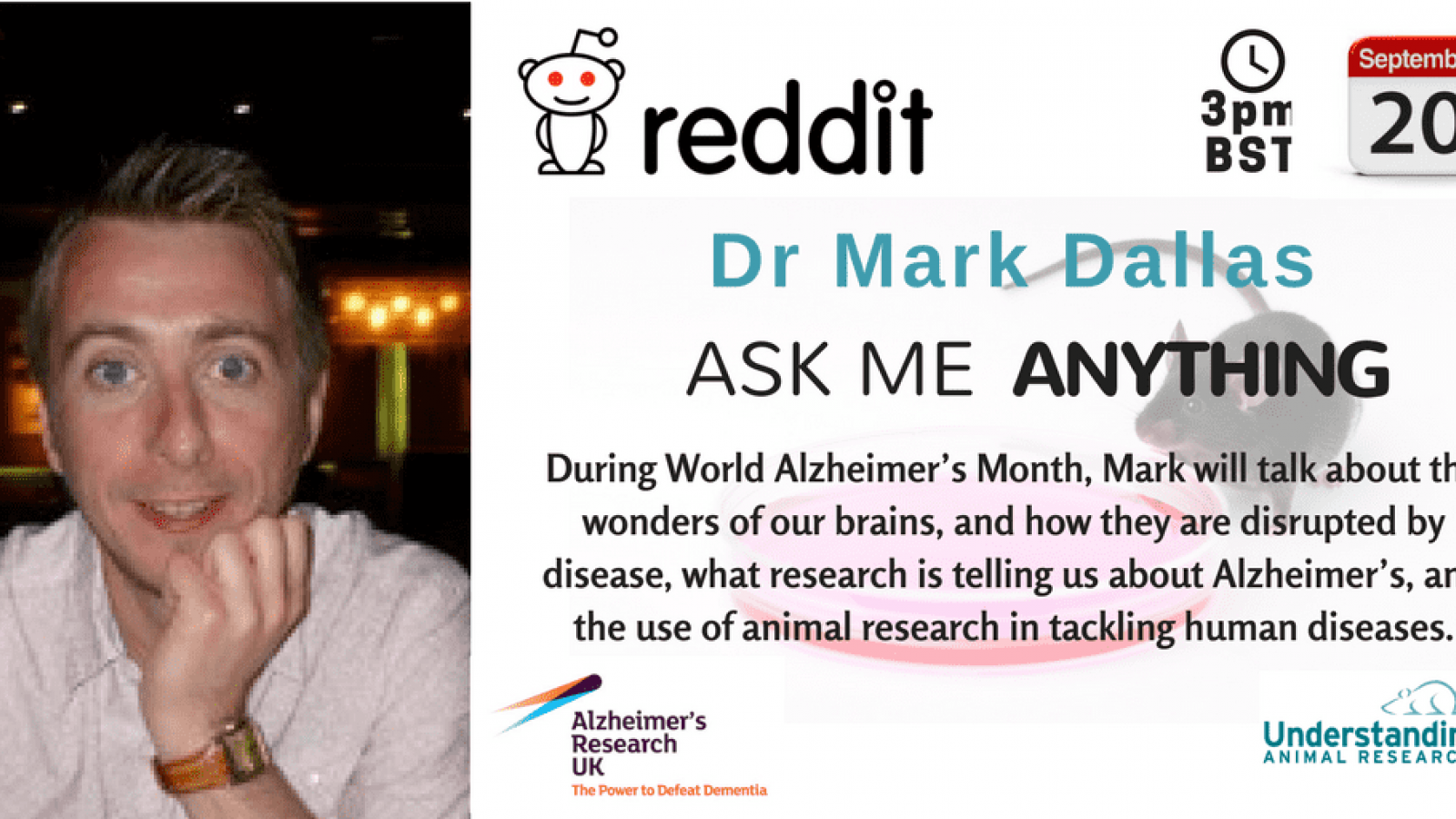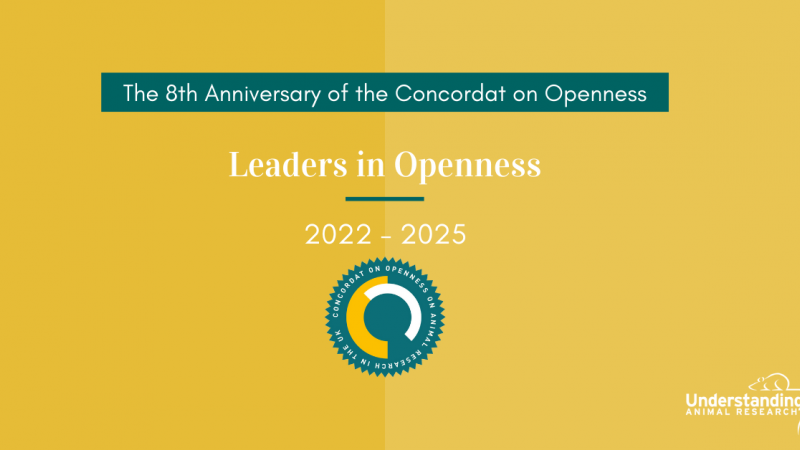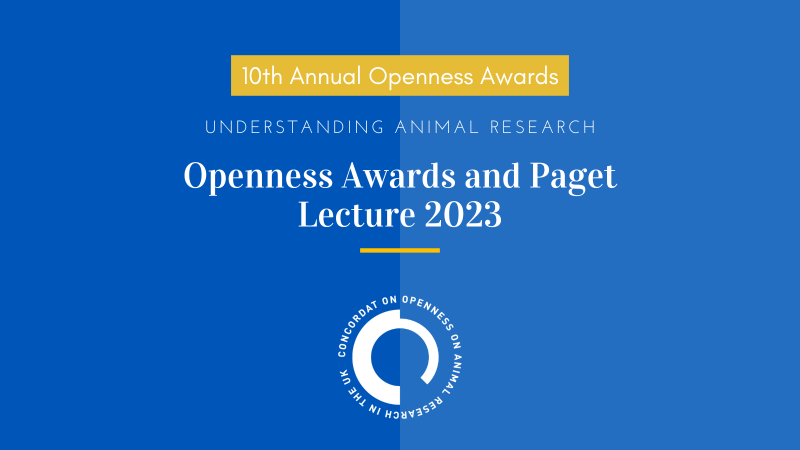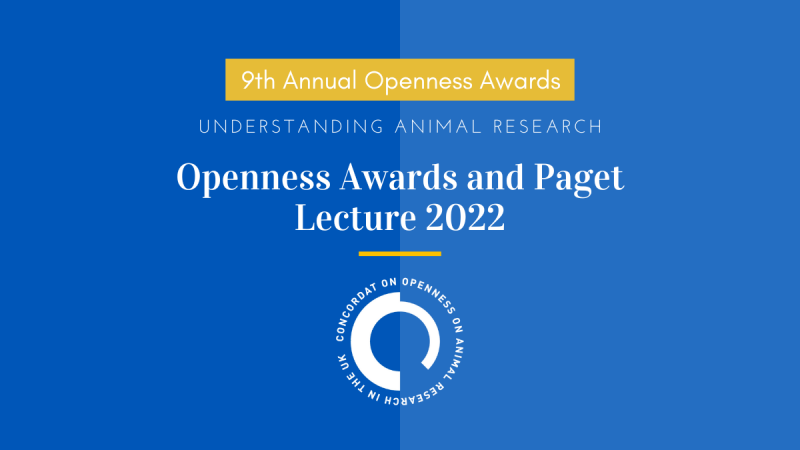To mark World Alzheimer’s Month, Understanding Animal Research organised a Reddit ‘Ask Me Anything’ (AMA) with Dr Mark Dallas on Wednesday 20th September.
Mark is a Lecturer in Cellular and Molecular Neuroscience at the School of Pharmacy, University of Reading, where he has worked for four years. He is Academic Co-ordinator for the Alzheimer’s Research UK Oxford Network, Neuroscience Theme Lead for the Physiological Society and on the editorial board of Physiology News.
His main research interest is working to understand the mechanism by which our brains change, leading to devastating diseases such as Alzheimer’s. Today, 850,000 people in the UK live with dementia, and currently there is no treatment that will prevent, cure or slow down its progression. Mark’s experiments look at glial cells within the brain and how they respond in the face of stressful stimuli. By using a diverse array of model systems, from cultured cells to rodents, he hopes that these non-neuronal cells can provide insight and early indication as to the onset of disease, well before clinical symptoms.
The AMA was up-voted over 300 times, and nearly 100 questions were submitted by Reddit users, covering a variety of topics including in-depth queries about Mark’s research, general questions about Alzheimer’s and prevention, and questions about the use of animals in research.
Mark responded to 17 Reddit users during the session, with the most popular question being about misconceptions surrounding animal research. Mark mentioned that the Lab Animal Tour, developed by UAR, can be used as a tool to provide “insight into some current UK animal facilities”. He also spoke about how it’s important to inform the public and “be open about our scientific research and the models we use“, due to the many misconceptions around the number of animals used and the regulations surrounding this area of work.
One Reddit user asked Mark about the likelihood of finding a cure for Alzheimer’s. He responded:
“… while scientists tend to hide away from the word ‘cure’, these are exciting times in dementia research. There is double the number of clinical trials taking place in the field and we are all hopeful that these will provide a disease modifying treatment within the next 10 years. As a basic scientist there are several new avenues (e.g. cell types, new proteins) being explored which will hopefully enter clinical trials in the near future.”
When speaking further about Alzheimer’s research, Mark mentioned that it was unlikely there will be a “magic bullet” to combat the disease. Instead “we will be looking at a combination of therapies”. Patients “can present with different pathological hallmarks and clinical presentation… the disease is very much an individual one.”
Several Reddit users asked Mark about preventative measures i.e. diet and exercise, for reducing the chance of developing Alzheimer’s.
“Exercise is beneficial to the brain as well as our hearts, and studies highlight this. In the context of Alzheimer’s disease there is no definitive evidence to say that exercise prevents the disease. A package of healthy lifestyle choices (e.g. diet, exercise) will reduce the risk of developing dementia.”
When asked about the link between Alzheimer’s (AD) and “Type 3 diabetes”, Mark stated:
“…there is growing awareness of a link between diabetes and dementia, while not my direct area of research it is a growing area of interest for neuroscientists and physiologists. We know that energy metabolism is compromised in AD, and evidence indicates insulin and insulin receptors are deficient in AD.
“Indeed communication between nerve cells requires a lot of energy. If you deprive nerve cells of the necessary support, communication fails which leads to a breakdown in signalling within the brain.
“There are many theories around this; however scientists are still working on these pathways to provide evidence linking the two pathways.”
On the subject of animal research, Mark stated that GM animal models have “provided a wealth of information for a host of diseases, including complex neurological disorders”. He spoke about human stem cells now being used to “provide a better representation of the human disease”, however “this research is in its infancy and models are still being validated”. To fully understand disease “a combination of both models will give us the best insight … and be critical to tackling dementia”.
Mark was clear to state that whilst there are tests available to detect Alzheimer’s, people should speak with their GP in the first instance if they are concerned about themselves, or a family member, developing the disease.
Speaking after the event, Mark commented how he thought the AMA “was a great opportunity to engage with a diverse audience about my dementia research”. Despite finding the experience daunting at first, he thought it “was a great way to communicate science to the masses, without having to stand in front of them all!”
This AMA follows successful sessions with Prof Roger Lemon who explained the importance of Non-Human Primates in research, Dr Karen Mifsud who spoke about her stress research during Stress Awareness Month, Professor Sir Colin Blakemore, following his Paget Lecture in December 2015, and UAR Chief Executive Wendy Jarrett, following the launch of the Concordat on Openness on Animal Research in May 2014. If you would like to take part in an AMA yourself then please get in touch with Hannah Hobson (hhobson@uar.org.uk) as UAR can offer support and guidance throughout the entire process.
To read all of Mark’s AMA, click here.
Last edited: 28 October 2022 15:09




